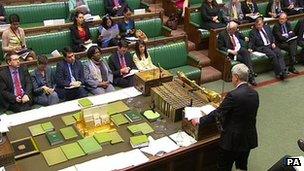MPs change sitting hours in 'people friendly' move
- Published

MPs will only have one late-night sitting a week
MPs have voted to change the hours they sit in Parliament, starting business earlier on Tuesday and Thursday.
Proceedings in the Commons will begin at 11.30 BST on Tuesday, rather than 1430 BST now, while Thursday's business will start an hour earlier at 0930 BST.
Supporters said the "people friendly" move would reduce the number of late night votes and make travel easier.
MPs also decided to shorten their summer recess by making September sittings a permanent fixture.
The changes mean late-night sittings will now only take place on Monday.
'More manageable'
MPs decided by 267 votes to 233 to end business on Tuesday at 1900 BST, rather than 2230 BST at the moment. The change to proceedings on Thursday - carried by 280 votes to 184 - will see business end at 1700 BST rather than 1830 BST.
Labour's Joan Ruddock said the proposals were "a very small attempt to make this workplace more manageable".
She said constituents were "amazed" that MPs now often began voting at 2200 BST, making life difficult for them getting home afterwards.
"Most MPs say they are perpetually tired, stressed and they find the late hours a particular problem," she said.
"For many of us, having an earlier start and an earlier finish would actually make us feel better, think better and probably be healthier as a consequence."
She insisted MPs were not trying to reduce their workload but to work "smarter hours" more in keeping with other professionals.
Backing the motion, Conservative Anna Soubry said more needed to be done to encourage people - particular those with young children - to become MPs and prevent a "grave crisis in our democracy".
And fellow Tory MP Aidan Burley said earlier finishes would help curb a "problem with late night boozing and an alcohol culture" fuelled by people having to wait around to vote.
'Lucky'
MPs opposing an earlier start on Tuesday said it would disrupt the work of select committees, many of which meet at that time, as well as making it harder for MPs to meet constituents and take visitors such as groups of school children round Parliament.
Former justice secretary Jack Straw said the early start on Tuesday was "unworkable" and would clash with meetings of government committees and the shadow cabinet.
He said it was wrong to characterise the changes as "family-friendly" as all MPs' circumstances were different and for members representing constituencies far away from London it made little difference if business ended at 1900 rather than 2200.
"Extravagant claims have been made about changing the hours and they have all turned to dust," he told MPs. "There is no single rule about what suits families."
And Labour colleague Sir Gerald Kaufman said MPs were "lucky to be here" and the debate on working hours was "degrading" at a time of mass unemployment. "It is about time we stopped this navel gazing," he said.
MPs voted to maintain the current arrangements for Monday and Wednesday and will continue to start business in the Commons chamber at 1430 BST and 1130 BST respectively.
MPs also chose to make September sittings a permanent feature of the parliamentary calendar, effectively cutting short their summer recess. The Commons has reassembled in September for two weeks prior to the party conference season in each of the past two years.
Both the government and Labour backed a motion to make this permanent from 2013.
Labour MP David Winnick said the public regarded the summer recess as a holiday and to oppose a September session would have been "disastrous" for the reputation of the Commons.